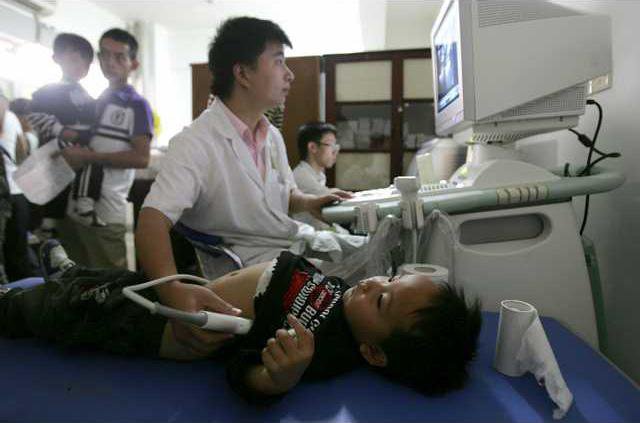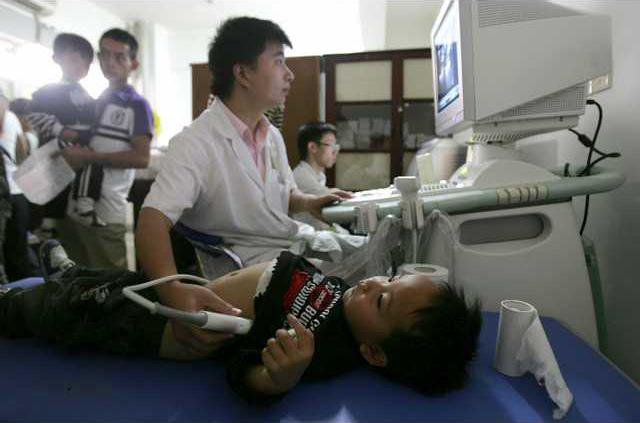SHIJIAZHUANG, China — China’s food safety crisis widened Friday after the industrial chemical melamine was found in milk produced by three of the country’s leading dairy companies — prompting stores, including Starbucks, to yank milk from their shelves.
The recalls come as evidence is mounting that adding chemicals to watered-down milk was a widespread practice in China’s dairy industry.
Sipping from a carton of milk at a news conference, the chief financial officer of one of the companies, Mengniu, apologized for the tainted milk. But he insisted only a small portion of the company’s inventory had been contaminated and said the tainted milk came from small-scale dairy farmers.
‘‘Large-scale milk farms are very disciplined. They won’t take the risk to do something like that,’’ Yao Tongshan told reporters in Hong Kong.
The crisis was initially thought to have been confined to tainted milk powder, used to make baby formula that has been blamed in the deaths of four infants and for sickening 6,200 other children.
But tests found melamine in samples of liquid milk taken from China’s two largest dairy producers, Mengniu Dairy Group Co. and Yili Industrial Group Co., as well as Shanghai-based Bright Dairy. The chemical, which is used in plastics and fertilizers, can cause kidney stones and lead to kidney failure.
All batches that tested positive were being recalled, China’s product safety watchdog said in a report on its Web site. It pledged to ‘‘severely punish those who are responsible.’’
Melamine, which is high in nitrogen, makes products with it appear higher in protein. Suppliers trying to cut costs are believed to have added it to watered-down milk to cover up the resulting protein deficiency.
No tainted infant formula has turned up in the United States, where authorities have inspected more than 1,000 retail markets mainly serving Asian communities. China is an importer of liquid milk, so it’s unlikely that milk from that country would have been shipped to the U.S.
But the Food and Drug Administration said it is stepping up inspections at ports as a precaution. Inspectors will be sampling bulk shipments of food ingredients from Asia that are derived from milk, such as milk powder and whey powder. The FDA also plans to issue a consumer alert warning people not to buy milk products from China on the Internet.
A senior dairy analyst said Chinese farmers were cutting corners to cope with rising costs for feed and labor.
‘‘Before the melamine incident, I know they could have been adding organic stuff, say animal urine or skin,’’ said Chen Lianfang of Beijing Orient Agribusiness Consultant Co. ‘‘Basically, anything that can boost the protein reading.’’
But he and others expressed skepticism that so many farmers would know to add melamine to milk. The chemical is not water-soluble and must be mixed with formaldehyde or another chemical before it can be dissolved in milk.
‘‘Farmers can’t be well-educated enough to think of melamine,’’ Chen said. ‘‘There must be people from chemical companies contacting them and telling them it’s a good idea.’’
The product safety agency and the Health Ministry declined to answer questions Friday about how widespread the practice of adding melamine to milk was believed to be.
‘‘I don’t know if this is an industrywide problem, but it is definitely not a single case. It is on a massive scale,’’ said E.R. Hong, an executive of Hua Xia Dairy Ltd., a U.S.-owned dairy farm east of Beijing that has not been accused of supplying tainted milk.
The crisis highlights the growing influence of dairy products in the Chinese diet. Milk is not part of the traditional Chinese diet, but the country’s economic growth and the increased availability of refrigeration have brought about a wide range of products, with flavored milk and sweetened yogurts among the most popular.
Though per capita consumption of dairy products in China is still low at 1.5 ounces per day, increasingly affluent Chinese consumers are paying more attention to their health and view milk as highly nutritious, particularly for children.
The crisis has raised questions about the effectiveness of tighter controls China promised after a series of food safety scares in recent years over contaminated seafood, toothpaste and a pet food ingredient tainted with melamine that was blamed for the deaths of dogs and cats in the United States. In 2004, more than 200 Chinese infants suffered malnutrition and at least 12 died after being fed phony formula that contained no nutrients.
Reactions to the latest recalls were immediate.
Starbucks Corp. said its 300 cafes in mainland China were pulling all milk supplied by Mengniu, though the Seattle-based company said no employees or customers had fallen ill from the milk.
Major Hong Kong grocery chains PARKnSHOP and Wellcome ordered Mengniu liquid milk removed from their shelves Friday, a day after products made by Yili, including milk, yogurt and ice cream, were taken off. Singapore suspended the sale and import of all Chinese milk and dairy products Friday.
Meanwhile, two distributors of Sanlu baby formula said the company ordered them to pull its products off shelves in early July, weeks before it announced its milk powder was contaminated.
The statements raised further questions about when the company and government knew the formula was contaminated.
Sanlu received complaints as early as March and tests in early August found the milk powder contained melamine. However, no recall was ordered until Sept. 11, after its New Zealand stakeholder told the New Zealand government, which then informed the Chinese officials.
One of the distributors, Zhang Youqiang, said Sanlu ordered all formula with production dates from 2007 to July 2008 be yanked from shelves.
‘‘Then things got weird. In early August, they came to us again and said all the new Sanlu baby milk powder we had just put on the shelves’’ did not meet a government standard unrelated to product quality, said Zhang, who declined to name the distributor he works for in Hebei province.
Another distributor, Liang Jianqiang, said he also took Sanlu baby milk powder out of stores in July. ‘‘They told me there would be a new formula that’s better quality. They did this again in August and September,’’ he said.
Phone calls to Sanlu rang unanswered Friday, and its Web site was not working. China’s quality watchdog did not respond after asking that questions be faxed over.
————
Associated Press writers Chi-Chi Zhang in Beijing, Dikky Sinn in Hong Kong, Alex Kennedy in Singapore and Bonnie Cao in Beijing contributed to this report.
Milk off shelves as Chinas safety scandal grows


Sign up for the Herald's free e-newsletter